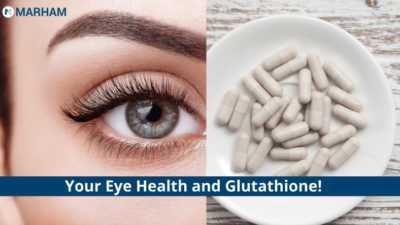Glutathione is a powerful antioxidant that helps protect the body against free radicals. Glutathione also plays an important role in eye health and can help keep your vision sharp as you age. In this blog post, we will discuss the glutathione benefits for eyes, and how you can increase glutathione levels to protect your vision!
What is Glutathione?
Glutathione is a small protein that is produced naturally in the body. It is made up of three amino acids: glutamic acid, cysteine, and glycine. It is found in every cell in the body, and it plays a vital role in many important processes.


Glutathione Eye Drops
Glutathione eye drops are a popular way to increase glutathione levels in the body. They are available over-the-counter and can be used to treat a variety of eye conditions.
These eye drops are most commonly used to treat dry eyes, but they can also be used to treat other conditions such as blepharitis and meibomian gland dysfunction.
Glutathione eye drops are safe for most people to use, but it is important to speak with your doctor before using them if you have any medical conditions.
Glutathione and Eye Color
Glutathione is also known to change eye color. It can be used to lighten the eyes, and it is also thought to help improve vision. Glutathione is a safe and effective way to change your eye color, and it is a popular choice for those looking for a non-invasive way to change their appearance.
Also check out: The 5 Best Eye Specialists In Lahore
Glutathione Benefits for Eye Health
Glutathione plays a vital role in eye health and can help keep your vision sharp as you age. Here are five glutathione benefits for eyes:


1. Protects from UV Damage
Glutathione can help protect the eyes from damage caused by ultraviolet (UV) light. Glutathione helps to filter out harmful UV rays and prevents them from damaging the eyes. Glutathione also helps to reduce inflammation and oxidative stress, which are both associated with age-related macular degeneration (AMD).
2. Improve Dry Eyes
Glutathione can help improve dry eye symptoms. Dry eye is a common condition that occurs when the eyes do not produce enough tears. Glutathione helps to keep the eyes lubricated and prevents them from drying out.
3. Might treat Blepharitis
Glutathione can help treat blepharitis. Blepharitis is an inflammation of the eyelids that can cause redness, itching, and burning. Glutathione can help to reduce inflammation and improve blepharitis symptoms.
4. Might Treat Meibomian Gland Dysfunction
Glutathione can help treat meibomian gland dysfunction. Meibomian gland dysfunction is a condition that causes the glands that produce tears to become blocked. Glutathione can help to unblock the glands and improve meibomian gland dysfunction symptoms.
5. Might Protect Eyes from Cataracts
Glutathione might help protect the eyes from cataracts. Cataracts are a common age-related eye condition that causes the lenses of the eyes to become cloudy. Glutathione helps to prevent oxidative damage, which is a major contributor to cataract formation.
Therefore, according to studies, even though there is no evidence that glutathione deficiency causes cataracts in people, it is theoretically possible.
Also read: 12 Black Currant Benefits for Eyes
How to Increase Glutathione Levels
Just like there are many glutathione benefits for eyes, there are also several ways you can increase glutathione levels in the body:
- Eat a diet that is rich in sulfur-containing foods. Foods that are high in sulfur include eggs, garlic, onions, and cruciferous vegetables such as broccoli and cabbage.
- Take supplements. Glutathione supplements are available in a variety of forms, including capsules, tablets, and powders.
- Get more exercise. Exercise helps to increase glutathione levels in the body.
- Reduce stress. Stress can deplete glutathione levels in the body, so it is important to find ways to reduce stress in your life.
Glutathione Side Effects


Glutathione is a safe and well-tolerated supplement, but there are a few potential side effects that you should be aware of. These side effects include:
- Nausea
- Diarrhea
- Headache
- Skin rash
If you experience any of these side effects, stop taking glutathione and speak with your doctor.
Glutathione is a powerful antioxidant that offers many benefits to the eyes. If you are looking for ways to improve your eye health, consider adding glutathione to your diet!
There are several easy ways to increase glutathione levels in the body, and most people tolerate it well with few side effects. However, as with any supplement, it is always best to speak with your doctor before starting any new supplement.
Consult an Eye Specialist!


If you have any concerns about your eye health, it is always best to consult an eye specialist. Glutathione can offer many benefits for the eyes, but it is not a substitute for professional medical care.
An Eye specialist is a doctor who specializes in the diagnosis and treatment of eye conditions and diseases. If you are experiencing any problems with your eyes, click here to make an appointment to see an eye doctor via Marham.
Can’t Find the App?
| Android | IOS |
|---|---|
  |
  |
FAQs
1. Is glutathione good for the retina?
Glutathione is a powerful antioxidant that helps protect the body against free radicals. So, glutathione is good for the retina.
2. Can glutathione reverse cataracts?
Yes, there is some evidence that glutathione can help reverse cataracts.
3. What does glutathione do in the lens?
Glutathione scavenges free radicals and neutralizes them before they can cause damage.

